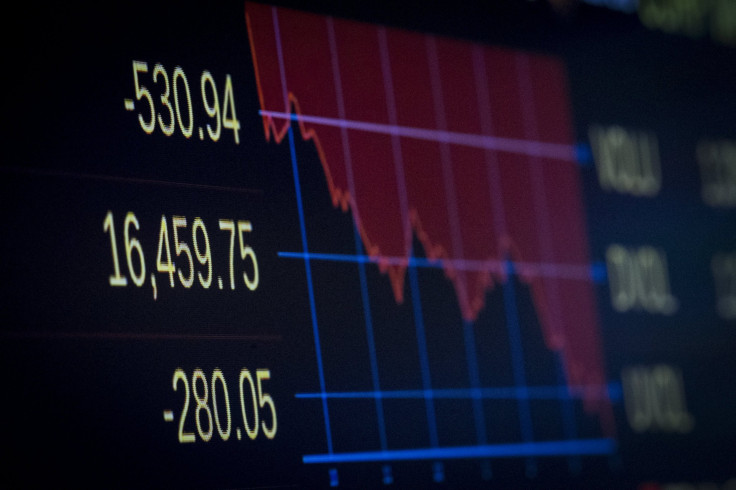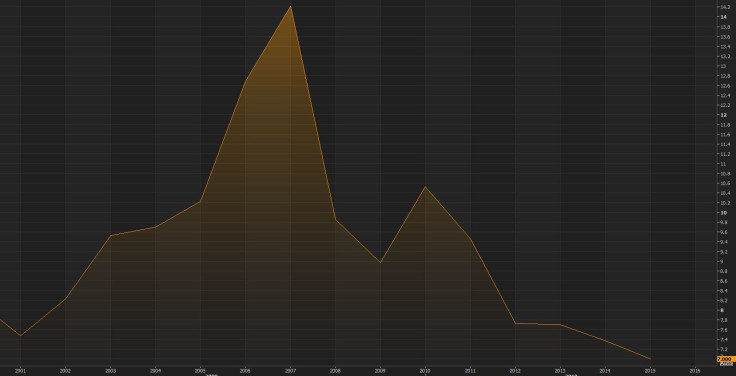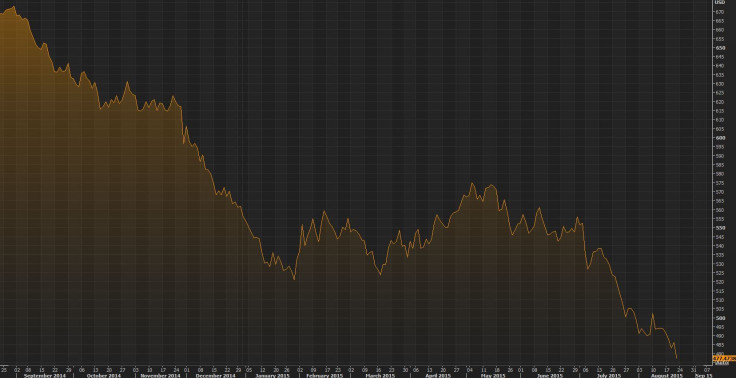3 Reasons Why The Dow Jones Industrial Average Dropped 500 Points

Global stocks sold off Friday, with the Dow Jones Industrial Average plummeting more than 500 points -- its ninth-biggest point drop ever -- to lose 1,000 points for the week. U.S. stocks closed sharply lower following volatile trading in Asia and Europe after China revealed new evidence of a sharper-than-expected economic slowdown. The losses sent the blue-chip index into correction territory for the first time since 2011.
Here are three reasons why.
1. China
China gets most of the blame for Friday’s global stock sell-off. The world’s second-largest economy posted factory production numbers Friday that suggest a faster economic slowdown than previously thought. Chinese factory production in August shrank at its fastest rate in more than six years, sparking concerns that China’s deceleration will have global effects.
Peter Cardillo, chief market economist at Rockwell Global Capital, estimates the Chinese economy will grow at an annual rate of 6.5 percent this year. That’s much lower than the country’s 2014 GDP growth rate of 7.4 percent, which marked its slowest annual pace in 24 years.
“If China’s economy does slow to 6.5 percent this year, that could be considered a mild recession for them,” Cardillo said.
Even before Friday’s rout, global stocks were jittery. Earlier this month, China unexpectedly devalued the yuan. At the same time, its benchmark Shanghai Composite has lost around 30 percent of its value from its peak in mid-June. The losses in China raised concerns over whether the Chinese government’s rescue efforts are capable of restoring market confidence.
“We’ve known that global growth has been slowing for a while, but when China started devaluing its currency and setting off a wave across other emerging markets, it made investors more nervous. Because they have to do something, problems must be worse than they thought,” said Karyn Cavanaugh, senior vice president and senior market strategist at Voya Investment Management.

2. Federal Reserve
Although most economists still expect that the U.S. central bank will raise interest rates as early as September, an increasing number now say it's possible the Fed is rethinking its plan. Even before China has devalued its currency, the U.S. Federal Reserve was questioning its stance on an interest rate increase planned for sometime later in 2015.
After Friday's rout in the global stock markets, the Fed may wait until after September to lift rates. Minutes from the central bank’s July meeting, released earlier this week, indicate conditions for the first rate increase in about a decade had not been met, due primarily to muted price increases. U.S. inflation has run below the Federal Reserve’s 2 percent target for 38 straight months.
And then there’s China.
“The global demand story, which is supported by the Chinese demand story, just isn’t there right now,” says Stephen Guilfoyle, managing director of NYSE floor operations at Deep Value Inc. “If the Fed doesn’t raise rates, it could signal the economy is truly weaker than everyone previously expected.”
3. Commodities
A deeper concern for investors is how China’s growth rate affects demand for global commodities. China is the world’s largest commodity consumer. But with Chinese factory production now at a six-and-a-half-year low, commodity-producing nations fear China’s demand for raw materials is waning.
“Brazil and Russia are in the midst of a very deep recession,” said Bill Adams, senior international economist at PNC Financial Services Group. “There’s a strong argument that China’s weakness, as well as weakness to other commodity-focused emerging markets is due to low global prices and weak global demand for what they export.”
The S&P GSCI, a benchmark for commodity-markets investments, has dropped more than 40 percent in the last 12 months. U.S. oil prices dropped below $40 a barrel Friday for the first time since the global economic crisis.

© Copyright IBTimes 2024. All rights reserved.






















